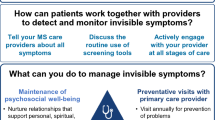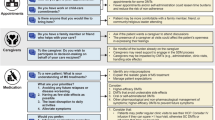Abstract
Context
The question of how best to disclose to patients the diagnosis of serious and/or incurable neurological diseases has been much explored, but that of when has received little rigorous study. The present study investigates this question in relation to multiple sclerosis (MS), a disease marked by its incurability, unpredictability and predilection for young adults.
Objectives
We aimed to ascertain the preferences of Greek MS sufferers concerning when they should ideally be informed they have the disease, and their preferences and reactions regarding disclosure of the diagnosis. Design, setting and patients 1200 Greek MS patients,members of the MS Society, were asked to complete a questionnaire regarding their experience of and attitudes towards receiving the diagnosis.
Design, setting and patients
1200 Greek MS patients,members of the MS Society, were asked to complete a questionnaire regarding their experience of and attitudes towards receiving the diagnosis.
Results
657 patients (55 %) responded. 91% favoured learning the diagnosis immediately, but only 44% had had this experience: 29% had been informed within 1–3 years, and 27% later. Interestingly, however, a significant minority (9 %) suggested a possible preference for delayed delivery of diagnosis and 23.2% stated that concealing the diagnosis would not lead to loss of confidence in their doctor.
Conclusion
This study—the largest of its kind—provides objective data supporting prompt disclosure of diagnosis as the clearly–expressed preference amongst most patients. Interestingly, however, the results also reemphasise the importance of a difficult medical art: attempting to judge whether an individual patient is one (of the 91%) preferring immediate disclosure—or of the nearly 1–in–10 (9%) who may not.
Similar content being viewed by others
References
Borasio GD, Sloan R, Pongratz DE (1998) Breaking the news in amyotrophic lateral sclerosis. J Neurol Sci 160(Suppl 1):S127–S133
Elian M, Dean G (1985) To tell or not to tell the diagnosis of multiple sclerosis. Lancet 2:27–28
Ellis PM, Tattersall MH (1999) How should doctors communicate the diagnosis of cancer to patients? Ann Med 31:336–341
Guillem–Mesado A, de AC, Lopez– Longo J, Gimenez–Roldan S (1998) Information about the diagnosis: a subjective experience of patients with multiple sclerosis and rheumatoid arthritis. Rev Neurol (Paris) 26:25–28
Haberfellner EM, Markut H (1995) Patient education in multiple sclerosis: experiences and wishes of affected patients. Wien Med Wochenschr 145:218–222
Hartwich P (1979) The question of disclosing the diagnosis to terminally ill patients. Arch Psychiatr Nervenkr 227:23–32
Hirschmann J, Zimmermann CW (1987) Multiple sclerosis–disclosing the diagnosis, Attitude of patients: when? How? Disclose at all?. Fortschr Neurol Psychiatr 55:263–272
Holroyd S, Snustad DG, Chalifoux ZL (1996) Attitudes of older adults' on being told the diagnosis of Alzheimer's disease. J Am Geriatr Soc 44:400–403
Loge JH, Kaasa S, Hytten K (1997) Disclosing the cancer diagnosis: the patients' experiences. Eur J Cancer 33:878–882
Novack DH, Plumer R, Smith RL, Ochitill H, Morrow GR, Bennett JM (1979) Changes in physicians' attitudes toward telling the cancer patient. JAMA 241:897–900
Robinson I (1985) Multiple sclerosis: to tell or not to tell. Lancet 2:336
Turnbull Q, Wolf AM, Holroyd S (2003) Attitudes of elderly subjects toward "truth telling" for the diagnosis of Alzheimer's disease. J Geriatr Psychiatry Neurol 16:90–93
Author information
Authors and Affiliations
Corresponding author
Rights and permissions
About this article
Cite this article
Papathanasopoulos, P.G., Nikolakopoulou, A. & Scolding, N.J. Disclosing the diagnosis of multiple sclerosis. J Neurol 252, 1307–1309 (2005). https://doi.org/10.1007/s00415-005-0969-7
Received:
Revised:
Accepted:
Published:
Issue Date:
DOI: https://doi.org/10.1007/s00415-005-0969-7




